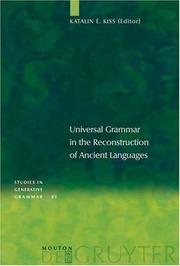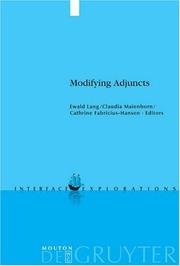| Listing 1 - 4 of 4 |
Sort by
|
Book
ISBN: 9780415395984 0415395984 9780203929247 0203929241 9781134156306 9781134156344 9781134156351 9780415808194 Year: 2009 Publisher: New York London Routledge
Abstract | Keywords | Export | Availability | Bookmark
 Loading...
Loading...Choose an application
- Reference Manager
- EndNote
- RefWorks (Direct export to RefWorks)
This volume is about dislocation i.e. the removal of phrases from their canonical positions in a sentence to its left or right edge. Dislocation encompasses a wide range of linguistic phenomena, related to nominal and adverbial expressions and to the informationstructuring notions of topic and focus; and takes intriguingly different forms across languages. This book reveals some of the empirical richness of dislocation and some key puzzles related to its syntactic, semantic, and discourse analysis.
Discourse analysis --- Discourse analysis. --- Grammar, Comparative and general --- Discoursanalyse. --- Pragmatiek. --- Semantiek. --- Vergelijkende en algemene grammatica --- Syntax --- Syntax. --- Syntaxis. --- 801.56 --- 801.56 Syntaxis. Semantiek --- Syntaxis. Semantiek --- Linguistics --- Philology


ISBN: 9783110185508 3110185504 3110902222 9783110902228 Year: 2011 Volume: 83 Publisher: Berlin Boston
Abstract | Keywords | Export | Availability | Bookmark
 Loading...
Loading...Choose an application
- Reference Manager
- EndNote
- RefWorks (Direct export to RefWorks)
Philologists aiming to reconstruct the grammar of ancient languages face the problem that the available data always underdetermine grammar, and in the case of gaps, possible mistakes, and idiosyncracies there are no native speakers to consult. The authors of this volume overcome this difficulty by adopting the methodology that a child uses in the course of language acquisition: they interpret the data they have access to in terms of Universal Grammar (more precisely, in terms of a hypothetical model of UG). Their studies, discussing syntactic and morphosyntactic questions of Older Egyptian, Coptic, Sumerian, Akkadian, Biblical Hebrew, Classical Greek, Latin, and Classical Sanskrit, demonstrate that descriptive problems which have proved unsolvable for the traditional, inductive approach can be reduced to the interaction of regular operations and constraints of UG. The proposed analyses also bear on linguistic theory. They provide crucial new data and new generalizations concerning such basic questions of generative syntax as discourse-motivated movement operations, the correlation of movement and agreement, a shift from lexical case marking to structural case marking, the licensing of structural case in infinitival constructions, the structure of coordinate phrases, possessive constructions with an external possessor, and the role of event structure in syntax. In addition to confirming or refuting certain specific hypotheses, they also provide empirical evidence of the perhaps most basic tenet of generative theory, according to which UG is part of the genetic endowment of the human species - i.e., human languages do not "develop" parallel with the development of human civilization. Some of the languages examined in this volume were spoken as much as 5000 years old, still their grammars do not differ in any relevant respect from the grammars of languages spoken today.
Grammar --- Grammar, Comparative and general --- Extinct languages --- Extinct languages. --- Grammar, Comparative and general. --- Dead languages --- Languages, Extinct --- Comparative grammar --- Grammar, Philosophical --- Grammar, Universal --- Language and languages --- Philosophical grammar --- Grammar, Comparative --- Language obsolescence --- Linguistics --- Philology --- Grammaire comparée et générale --- Langues mortes --- Generative Linguistics. --- Indo-Germanic. --- Language Reconstruction.


ISBN: 3110173522 3111796817 3110894645 9783110894646 9783110173529 9783110173529 Year: 2013 Volume: 4 Publisher: Berlin Boston
Abstract | Keywords | Export | Availability | Bookmark
 Loading...
Loading...Choose an application
- Reference Manager
- EndNote
- RefWorks (Direct export to RefWorks)
Unlike the notion of "argument" that is central to modern linguistic theorizing, the phenomena that are commonly subsumed under the complementary notion "adjunct" so far have not attracted the attention they deserve. In this volume, leading experts in the field present current approaches to the grammar and pragmatics of adjuncts. The contributions scrutinize i.a. the argument-adjunct distinction, specify conditions of adjunct placement, discuss compositionality issues, and propose new analyses of event-related modification. They are meant to shed new light on an area of linguistic structure that is deemed to be notoriously overlooked.
Grammar, Comparative and general --- Adjuncts. --- Syntax. --- Grammar --- Adjoints (Linguistique) --- Syntaxe --- Adjunctivals (Grammar) --- Adjuncts (Grammar) --- Adjunctivals --- Language and languages --- Syntax --- Linguistics --- Philology --- Grammar, Comparative and general Syntax
Book

ISBN: 1501504681 9781501504723 150150472X 9781501504686 9781501513268 1501513265 1501504738 9781501504730 Year: 2017 Volume: 18 Publisher: Berlin Boston
Abstract | Keywords | Export | Availability | Bookmark
 Loading...
Loading...Choose an application
- Reference Manager
- EndNote
- RefWorks (Direct export to RefWorks)
In legal interpretation, where does meaning come from? Law is made from language, yet law, unlike other language-related disciplines, has not so far experienced its "pragmatic turn" towards inference and the construction of meaning. This book investigates to what extent a pragmatically based view of l linguistic and legal interpretation can lead to new theoretical views for law and, in addition, to practical consequences in legal decision-making.With its traditional emphasis on the letter of the law and the immutable stability of a text as legal foundation, law has been slow to take the pragmatic perspective: namely, the language-user 's experience and activity in making meaning. More accustomed to literal than to pragmatic notions of meaning, that is, in the text rather than constructed by speakers and hearers ... the disciplines of law may be culturally resistant to the pragmatic turn. By bringing together the different but complementary perspectives of pragmaticians and lawyers, this book addresses the issue of to what extent legal meaning can be productively analysed as deriving from resources beyond the text, ... beyond the letter of the law.This collection re-visits the feasibility of the notion of literal meaning for legal interpretation and, at the same time, the feasibility of pragmatic meaning for law. Can explications of pragmatic meaning support court actions in the same way concepts of literal meaning have traditionally supported statutory interpretations and court judgements? What are the consequences of a user-based view of language for the law, in both its practices of interpretation and its definition of itself as a field? Readers will find in this collection means of approaching such questions, and promising routes for inquiry into the genre- and field-specific characteristics of inference in law.In many respects, the problem of literal vs. pragmatic... meaning confined to the text vs. reaching beyond it ... will appear to parallel the dichotomy in law between textualism and intentionalism. There are indeed illuminating connections between the pair of linguistic terms and the more publicly controversial legal ones. But the parallel is not exact, and the linguistic dichotomy is in any case anterior to the legal one. Even as linguistic-pragmatic investigation may serve legal domains, the legal questions themselves point back to central conditions of all linguistic meaning.
Law --- Legal reasoning --- Methodology. --- Pragmatics. --- Language. --- Philosophy --- Law - Language. --- Law - Philosophy --- Inference. --- Law. --- Legal Interpretation.
| Listing 1 - 4 of 4 |
Sort by
|

 Search
Search Feedback
Feedback About UniCat
About UniCat  Help
Help News
News